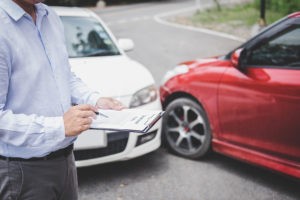What Should I Do? – Insurance Compensation After a Car Accident
 I. Details about the situation
I. Details about the situation
Laila is involved in a car accident with Masoud. He is at fault because he was driving recklessly. Laila’s car is damaged, and she has sustained a concussion and sprained neck. After speaking to him, Laila learns that Masoud does not have auto insurance. The police officer arrives to record the details and make an accident report. When the officer asks for the drivers’ documents, such as a driver’s license and proof of insurance, Masoud backs away a little and lets his friend Sohrab, who was in the car with him at the time of the accident, present himself to the officer as the driver because he has full insurance coverage. Laila is confused: what should she do to get compensation to fix her car and get medical treatment?
II. Background
Islam forbids lying, forgery, and false impersonation. Jurists have ruled that it is prohibited for Muslims to engage in any of these unlawful actions, which includes giving misleading information, falsification of documents, and other similar acts of deception that are unlawful, especially for Muslims who live in non-Islamic countries. In addition to being essentially prohibited (haram), these acts are also forbidden because they are a breach of civil covenants and contracts, which we agreed to as citizens and residents. This requires us to abide by the laws of the country and uphold the regulations of safety enforcement issued by the official authorities of the land. Lastly, these acts are also prohibited because they paint a negative and untrue image of Islam and Muslims. In this case, Sohrab lied and Masoud kept silent and accepted the deception. As such, Islam requires that everyone involved should enjoin what is good and forbid what is evil (amr bil maroof wa nahi aan al-munkar). Thus, they all stand between adherence to the law in fear of God and securing their financial matters.
III. Ruling
It is not permissible to violate Islamic laws, nor is it permissible to violate civil laws. Moreover, Laila must uphold what is right and reject what is false and unlawful, even if she is perplexed because she wants someone to cover the costs of her medical treatment and car repair. Thus, it is not permissible for her to take any compensation that results from falsification of documents, misrepresentation, or violation of civil law. Instead, it is the right of the victim to file a complaint to obtain their rights in a just and equitable manner.
IV. Action
Laila must report to the police what actually happened and tell them that the driver who was involved in the accident was Masoud. If the result is that she will not get the compensation she deserves to cover her treatment and the repair of her car, then she can consult with a legal expert and determine the best course for getting it from the person who is actually responsible.

Leave a Comment:
You must be logged in to post a comment.